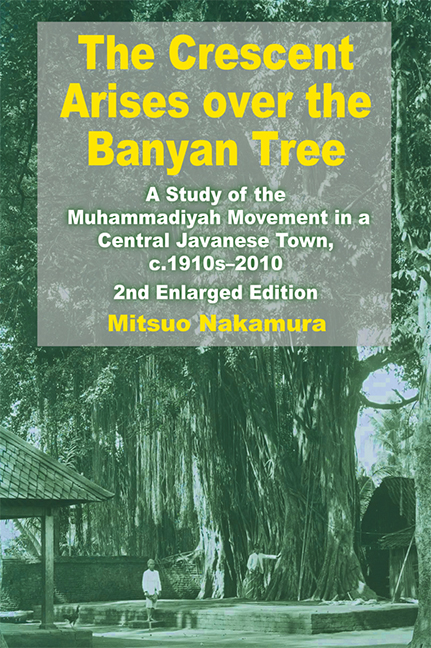 The Crescent Arises over the Banyan Tree
The Crescent Arises over the Banyan Tree Book contents
- Frontmatter
- Dedication
- Epigraph
- Contents
- List of Figures and Maps
- List of Tables
- List of Boxes
- Foreword to the Second Edition
- Preface to the Second Edition
- Foreword to the First Edition
- Preface to the First Edition
- Notes
- Map
- PART I DEVELOPMENT OF THE MUHAMMADIYAH IN KOTAGEDE, c.1910s–1972
- 1 Introduction: The Islamization of Java
- 2 Kotagede under the Banyan Tree: Traditional Society and Religion
- 3 The Beginning of the Muhammadiyah: Court Religious Officials and the Urban Middle Class
- 4 The Development of the Muhammadiyah: Religion and Social Action
- 5 The Sociology of Ummat Islam: Structure and Anti-Structure
- 6 The Ideology of the Muhammadiyah: Tradition and Transformation
- 7 Conclusion: Re-Islamization of Java
- Postscript to Part I
- PART II KOTAGEDE REVISITED, 1972–2010
- Bibliography
- Glossary
- Appendices
- Index
- About the Author
7 - Conclusion: Re-Islamization of Java
from PART I - DEVELOPMENT OF THE MUHAMMADIYAH IN KOTAGEDE, c.1910s–1972
Published online by Cambridge University Press: 21 October 2015
- Frontmatter
- Dedication
- Epigraph
- Contents
- List of Figures and Maps
- List of Tables
- List of Boxes
- Foreword to the Second Edition
- Preface to the Second Edition
- Foreword to the First Edition
- Preface to the First Edition
- Notes
- Map
- PART I DEVELOPMENT OF THE MUHAMMADIYAH IN KOTAGEDE, c.1910s–1972
- 1 Introduction: The Islamization of Java
- 2 Kotagede under the Banyan Tree: Traditional Society and Religion
- 3 The Beginning of the Muhammadiyah: Court Religious Officials and the Urban Middle Class
- 4 The Development of the Muhammadiyah: Religion and Social Action
- 5 The Sociology of Ummat Islam: Structure and Anti-Structure
- 6 The Ideology of the Muhammadiyah: Tradition and Transformation
- 7 Conclusion: Re-Islamization of Java
- Postscript to Part I
- PART II KOTAGEDE REVISITED, 1972–2010
- Bibliography
- Glossary
- Appendices
- Index
- About the Author
Summary
The struggle (perjuangan) to achieve a truly Islamic society (masyarakat Islam yang sebenar-benar-nya) is a struggle which has no breaks (tak putus-putus). It is like a relay race (permainan estafet); generation by generation (generasi demi generasi) taking turns to carry forward the relay baton [of the struggle] on the track of history. (Bulletin Lustrum Ke-I, S.M.P. Muhammadiyah VII, Kotagede, 1970, p. 21).
The thesis that has been developed in the foregoing chapters is that orthodox Islam in the form of a reformist movement, Muhammadiyah, has arisen from within the traditional Javanese Islam as its internal transformation rather than as an outright import of a new ideology made complete elsewhere. The reformist version of orthodox Islam has been a vigorously proselytizing religious ideology and has brought, is bringing, and will bring about profound changes in social, cultural, economic and political aspects of Javanese life. To support this thesis, attempts have been made to document, describe and analyse major aspects of this ongoing process of re-Islamization as it occurred in a local town, Kotagede in south Central Java, over the past seventy years or so.
If the thesis can be regarded as having been substantiated sufficiently, at least for one local case, then the view expressed here may appear to come into direct conflict with an assumption widely held among students of contemporary Indonesia that Islam, especially its reformist version, is losing political strength. For example, George Kahin has recently expressed such a view in his preface to Ken Ward's The Foundation of the Partai Muslimin Indonesia (1970). Kahin states:
Today [1970] Islamic political power in Indonesia has become considerably weaker [than in the early 1950s], and the influential Modernist Islamic elements who previously led the Masjumi are without political focus and organization (ibid., p. iii).
Another foreign observer of Indonesian politics, studying the results of the 1971 general election, noted a “surprisingly poor showing” of the electoral support the Parmusi obtained (Nishihara 1971, p. 50): the Parmusi votes of 5.36 per cent of the total votes in 1971 are compared to the Masyumi votes of 20.9 per cent of the total in the 1955 general election, and the figures have been regarded as firm evidence for the drastically weakening political strength of reformist Muslims (ibid., passim).
- Type
- Chapter
- Information
- The Crescent Arises over the Banyan TreeA Study of the Muhammadiyah Movement in a Central Javanese Town, c.1910s-2010 (Second Enlarged Edition), pp. 208 - 211Publisher: ISEAS–Yusof Ishak InstitutePrint publication year: 2012


